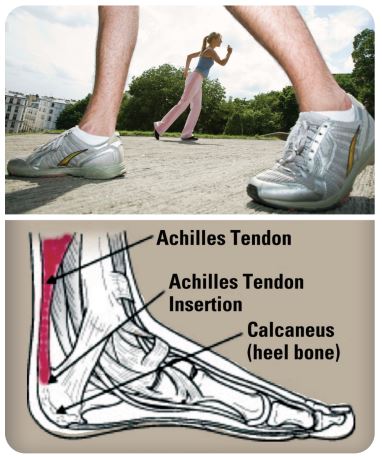 Although the Achilles tendon can withstand great stresses from running and jumping, it is also prone to tendinitis, a condition associated with overuse and degeneration. Simply defined, tendinitis is inflammation of a tendon. Inflammation is the body’s natural response to injury or disease, and often causes swelling, pain, or irritation. Achilles tendinitis is a common condition that causes pain along the back of the leg near the heel.
Although the Achilles tendon can withstand great stresses from running and jumping, it is also prone to tendinitis, a condition associated with overuse and degeneration. Simply defined, tendinitis is inflammation of a tendon. Inflammation is the body’s natural response to injury or disease, and often causes swelling, pain, or irritation. Achilles tendinitis is a common condition that causes pain along the back of the leg near the heel.
Achilles tendinitis is typically not related to a specific injury. The problem results from repetitive stress to the tendon. This often happens when we push our bodies to do too much, too soon, but other factors can make it more likely to develop tendinitis, including:
- Sudden increase in the amount or intensity of exercise activity
- Tight calf muscles
- Bone spurs on the heel
Common symptoms of Achilles tendinitis include:
- Pain and stiffness along the Achilles tendon in the morning
- Pain along the tendon or back of the heel that worsens with activity
- Thickening of the tendon
- Bone spurs
If you have experienced a sudden “pop” in the back of your calf or heel, you may have torn your Achilles tendon. See an Orthopaedic Clinic Doctor immediately if you think you may have torn your tendon.
When you visit The Orthopaedic Clinic, one of our doctors will examine your foot and ankle. They may order imaging tests to make sure your symptoms are caused by Achilles tendinitis.
In most cases, nonsurgical treatment options will provide pain relief, although it may take months for symptoms to completely subside. Even with early treatment, the pain may last longer than 3 months. The first step in reducing pain is to decrease or even stop the activities that make the pain worse. Placing ice on the most painful area of the Achilles tendon is helpful. Drugs such as ibuprofen and naproxen reduce pain and swelling. They do not, however, reduce the thickening of the degenerated tendon. Stretching and exercise can help to strengthen the calf muscles and reduce stress on the Achilles tendon. Physical therapy is very helpful in treating Achilles tendinitis. Cortisone, a type of steroid, is a powerful anti-inflammatory medication. Cortisone injections into the Achilles tendon are rarely recommended because they can cause the tendon to rupture (tear). Pain from Achilles tendinitis is often helped by certain shoes, heel lifts and orthotic devices.
Surgery should be considered to relieve Achilles tendinitis only if the pain does not improve after a long course of nonsurgical treatment. The specific type of surgery depends on the location of the tendinitis and the amount of damage to the tendon. Depending on the extent of damage to the tendon, some patients may not be able to return to competitive sports or running. Most patients have good results from surgery. The main factor in surgical recovery is the amount of damage to the tendon. Many patients require 12 months of rehabilitation before they are pain-free.
Our surgeons at The Orthopaedic Clinic have years of experience in treating Achilles tendonitis both surgically and non-surgically. If you are experiencing these symptoms, come see us today for a consultation and let us help get you “back on your feet.”
